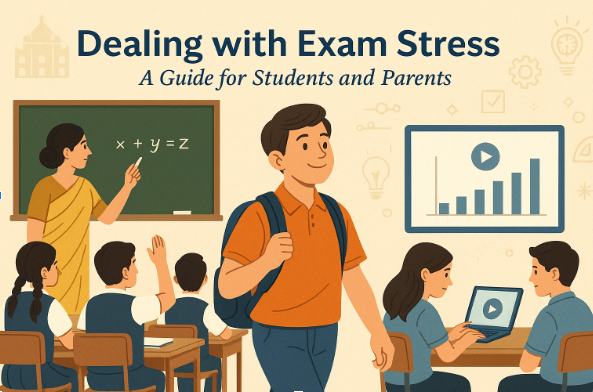Dealing with Exam Stress: A Guide for Students and Parents

Strong 8k brings an ultra-HD IPTV experience to your living room and your pocket.
In today’s competitive academic world, exam stress has become an almost inevitable companion for students. However, with the right mindset, strategies, and support from parents and educators, stress can be transformed into a powerful motivator. Drawing on the principles upheld by Dr. Kishore's Ratnam Schools—such as quality education, holistic education, and a fun and happy environment—this guide helps students and parents effectively tackle exam anxiety.
1. Build a Supportive Learning Environment
A nurturing environment is the foundation of stress resilience. Schools like Dr. Kishore's Ratnam Schools in Nellore and others actively foster a supportive learning environment, emphasising :
Open communication channels where students feel safe discussing their worries.
Value-based activities such as group projects or mindfulness exercises, designed to lower exam jitters by promoting empathy, collaboration, and self-awareness.
A fun and happy environment, featuring indoor games and art-themed breaks, that offer students the emotional refreshment needed during high-pressure times.
Tip for parents: Dedicate a calm, clutter-free study space at home—equipped with essentials, devoid of distractions—to echo the classroom’s supportive vibe.
2. Adopt Effective Teaching Practices & Best Syllabus Insights
Facing exams isn't just about cramming—it's about learning smartly. Effective teaching and syllabus clarity are pivotal:
Dr. Kishore's Ratnam Schools align with best practices of national and international syllabuses, giving students consistent frameworks that reduce uncertainty.
Effective teaching practices like interactive mock exams, timely feedback, and hands-on lab sessions help students grasp subjects meaningfully. Tools such as CCE (Continuous and Comprehensive Evaluation) have shown clear success in lowering anxiety by breaking assessments into smaller, less daunting steps .
Strengthening time-management skills through goal-setting, planning, and managing distractions helps students feel more confident and less overwhelmed.
Tip : Parents can support by reviewing planners with children, setting reasonable daily and weekly academic goals, and teaching prioritisation.
3. Embrace Holistic Education : Mind, Body & Soul
True holistic education enriches more than the mind—it nurtures the whole student:
Techniques like mindfulness, deep breathing, and meditation are integrated into school routines to enhance focus and emotional control.
Regular physical activity—through indoor sports, shuttle tournaments, or art center breaks—ensures students stay energized and less prone to mental fatigue .
Schools emphasise value-based activities, such as gratitude journals, community service, and teamwork challenges. These foster resilience, empathy, and optimism.
Tip: Create a daily or weekly home routine that includes a mindfulness break, a short walk, or a relaxing activity to buffer stress.
4. Prevent Procrastination & Equip with Stress-Busting Skills
Procrastination is often a key stress trigger. Combat it with intention:
Recognize procrastination early and replace it with structured routines, chunked study sessions, and stress-relief techniques.Use group study sessionsfor reducing stress.
Employ value-based activities like word games, quizzes, or brain teasers to make learning engaging and meaningful .
Maintain healthy habits with nutritious food, proper sleep, and hydration—common missteps that can degrade performance .
Tip: Guide children to break larger tasks into smaller parts and reward their progress—this keeps procrastination in check and morale high.
5. Cultivate Confidence & Value-Based Resilience
Confidence often falters under the weight of stress, but it can be rebuilt:
Schools promote value-based activities that emphasise perseverance, integrity, and gratitude—helping students face exams with a positive mindset.
Acknowledge effort and progress rather than just rewarding grades. Celebrate milestones and reinforce growth mindset thinking.
Teach children to reframe setbacks as learning opportunities—mirroring holistic schools that foster resilience by reframing mistakes as growth moments .
Tip for parents: Ask “What did you learn?” after mock tests. Praise their dedication, curiosity, and character—this builds long-lasting confidence.
Final Thoughts:
A Partnership of Trust & Encouragement
At its heart, dealing with exam stress is a team effort—students, educators, and parents working together through:
Providing quality education grounded in proven syllabus practices and supported by skilled, caring teachers.
Offering a holistic education that nourishes academic ability, emotional strength, physical health, and moral character.
Implementing effective teaching practices and a supportive learning environment, complete with fun, stress-relief, and peer learning.
Enriching children through value-based activities, life skills, and positive reinforcement.
Maintaining a fun and happy environment that lets students flourish.
Note: IndiBlogHub features both user-submitted and editorial content. We do not verify third-party contributions. Read our Disclaimer and Privacy Policyfor details.



